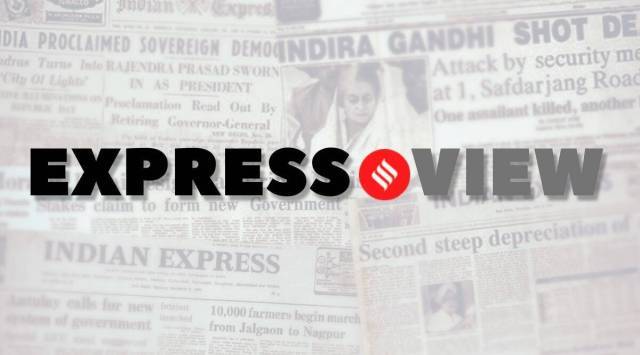Opinion Express View on Muzaffarnagar video: Teaching hate
Bigotry in the classroom needs a legal, social response but, more importantly, for those in power to break their silence. Too much is at stake
 Yet, the bigotry in the classroom captured by the Muzaffarnagar video is especially shocking — and it should be a special cause for concern. Because for any society and democracy, the classroom is a sacred space.
Yet, the bigotry in the classroom captured by the Muzaffarnagar video is especially shocking — and it should be a special cause for concern. Because for any society and democracy, the classroom is a sacred space. The video from the classroom of Neha Public School, Khubbapur village, district Muzaffarnagar, in which, last week, a teacher instructed students to hit and slap a Muslim classmate, one by one, as punishment for a mistake in his schoolwork, calls for a moment of pause. Admittedly, the incident is set in a larger backdrop. An increasing political polarisation is steadily trickling into public and private spaces, giving electoral contests a new edge, and circumscribing debates in between elections. In the social media age, there are many more incentives for views that veer to the extremes and stay there, than for positions that reflect reason and sobriety, much less openness and tolerance.
Yet, the bigotry in the classroom captured by the Muzaffarnagar video is especially shocking — and it should be a special cause for concern. Because for any society and democracy, the classroom is a sacred space. What is taught and what is learnt in it reaches into the future. The prejudice that made the teacher in Muzaffarnagar choreograph the horrific punishment and draft seven-year-olds into its brutish design, and the normalisation of prejudice which dictates her and-so-what responses in the aftermath, speak of disquieting things. The incident in Kathua, also last week, in which a Muslim teacher in a government higher secondary school beat up a student for writing “Jai Shri Ram” on the blackboard does not cancel out the Muzaffarnagar outrage — it only adds to it.
The incidents in Muzaffarnagar and Kathua call for a larger reckoning. Such incidents recur in the silence and ambivalence that settles around them, after a perfunctory show of indignation. They repeat themselves in the spaces vacated by a political system that turns a blind eye and deaf ear to them.
The responsibility to counter the brutalisation of the classroom must be owned by civil society, of course, but the onus is primarily on the political leadership, and especially the government. A message must be sent out by the powerful that there will be no more climate of impunity for hate speech and action. They must signal that they will act on the anguished directions of the apex court which has, more than once, urged greater vigilance and stricter action against those who violate the guiding principle of “fraternity assuring the dignity of the individual and unity and integrity of the country” enshrined in the Preamble of the Constitution.
There is too much at stake. Quite simply, the steps forward taken by the new National Education Policy, which seeks to promote a more innovative teaching and a more creative learning, the slogans that celebrate Make in India and the demographic dividend will be tested if hate is allowed to enter the classroom — and get away with it.



